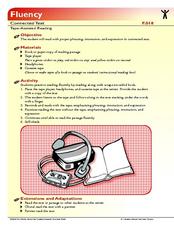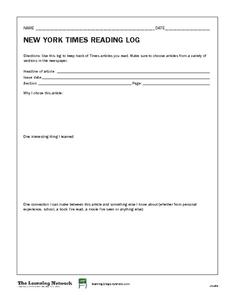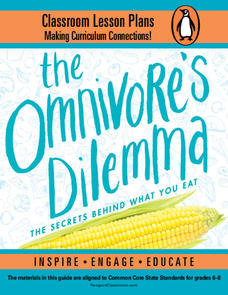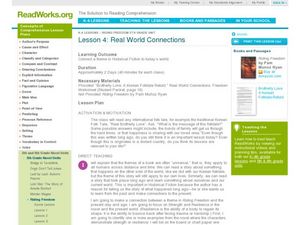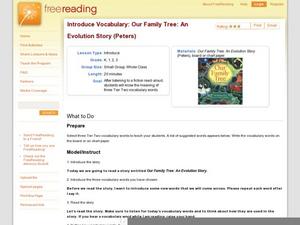Annenberg Foundation
America's History in the Making: Using Digital Technologies
How can digital technology of today link us to the events of the past? Scholars use technology to uncover the vast number of historical resources available in lesson 12 of a 22-part America's History in the Making series. Using databases...
McGraw Hill
Study Guide for Island of the Blue Dolphins
Dive your class into a reading of Island of the Blue Dolphins with this in-depth study guide. Breaking the novel into three parts, the resource begins each section with a focus activity that identifies a specific theme or question to be...
Computer Science Unplugged
Twenty Guesses—Information Theory
How do we determine how much information to include and what can be left out? By playing a game of 20 questions, the class generates the best strategies for finding a number. They then move on to guessing the next letter in a short...
University of Texas
Matter and the Periodic Table Chemical Families and Periodic Trends
Is assembling the periodic table as simple as Tetris? Scholars arrange colored cards into a logical order and then make connections to the arrangement of the periodic table. Hands-on activities include adding trend arrows and analyzing...
EngageNY
Synthesizing Research: How Colonists Were Interdependent
Following the formative assessment of this unit, young scholars present the information they gathered on their specific colonial trade to the rest of the class. Working in groups, learners create posters describing the particular job...
ReadWriteThink
Comics in the Classroom as an Introduction to Narrative Structure
A picture is worth a thousand words, but a comic strip combines both images and words for the ultimate narrative effect. After reading The Three Little Pigs and deciphering the plot elements, elementary readers work through four...
Curated OER
Making Connections
Connections or "links that readers can make between what they are reading and things they already know. . ." are the focus of a persentation that looks at how to make text-to-self, text-to-text, and text-to-world links.
Curated OER
Zoom Broom
Learners explore comprehension strategies as they listen to Zoom Broom by Margie Palatini. As the story is read, teacher and pupils will stop occasionally to make text-to-text, text-to-self, or text-to-world connections. They also...
Hawaiʻi State Department of Education
Text Connections
There are so many different ways to help learners make text-to-self connections. Here, fifth graders will create tableaus that show an event from a chapter in the class reader. They'll discuss why they chose that event to dramatize and...
Florida Center for Reading Research
Fluency: Connected Text, Recorded Reading
Scholars listens to a story on headphones while he reads along with a visual text using intonation, correct pacing, and fluency.
Odell Education
Making Evidence-Based Claims: Grade 9
Sorry, Charlie. Scholars take a close look at Apology by Plato. Activities analyzing the text help pupils understand, make, organize, and write about claims. Learners work in groups, complete claim tools, and evaluate thinking by filling...
The New York Times
New York Times Reading Log
Inspire your pupils to read the news and make connections between articles and another text, event, or experience with a straightforward reading log. Learners note down the article information at the top of the worksheet and then respond...
Curated OER
Making Connections between Robert Frost's Life and His Poetry
Become acquainted with Robert Frost's life in order to allow your class to fully appreciate how his background influenced his poetry. They analyze specified poems in relation to theme, setting and the use of imagery.
Penguin Books
The Omnivore’s Dilemma, Young Readers Edition
As the saying goes, you are what you eat. A useful set of lesson plans encourage young readers to take a second look at their eating habits. Pre- and post-reading questions bring in reflective writing and discussion while extension...
Curated OER
Real World Connections
Explore universal themes in literature with a literacy and multicultural awareness lesson. Elementary and middle schoolers make real world connections between themes in books from several cultures. They make inferences and locate text...
Curated OER
Introduce Vocabulary: Clouds (Bauer)
What type of cloud is that? Explore meteorological vocabulary using Marion Bauer's book, Clouds (although these strategies could be used for any fiction or nonfiction text). Pre-teach the new words before reading the story aloud....
Curated OER
Introduce Vocabulary: Dolphin's First Day (Zoehfeld)
Travel out to sea as scholars learn vocabulary in context through Kathleen Zoehfeld's informational book Dolphin's First Day. Go over the new words scholars will hear before reading: approach, coast, expert, feeble, gaze, murky, propel,...
Curated OER
Introduce Vocabulary: George's Store at the Shore (Bassede)
Combine counting and vocabulary using Francine Bassede's book George's Store at the Shore, which has learners exploring new words and numbers 1-10. Suggested words for this text are: arrange, assortment, customers,...
Curated OER
Introduce Vocabulary: Our Family Tree: An Evolution Story (Peters)
Lisa Peters presents macroevolution as a large-scale family tree in her book Our Family Tree: An Evolution Story. She suggests the process from single-celled organisms to modern-day humans, and learners explore new vocabulary through the...
Curated OER
Introducing Vocabulary: Christopher Columbus (Weinberger)
The story of Christopher Columbus has fascinated young historians for centuries; use this vocabulary-in-context strategy to dive into Kimberly Weinberger's picture book about this classic explorer. Begin by introducing the new words:...
Curated OER
How Much Is A Million
Help young learners visualize the concept of "a million." To convey concepts of numeration and literacy, they will listen to the book How Much is a Million? by David Schwartz. They should be able to make self-to-text connections....
Novelinks
The Tempest: Anticipation Guide
Begin your unit on William Shakespeare's The Tempest with a helpful anticipation guide. Learners read ten statements that connect to the play's literary themes, and note whether they believe the statement is true or false.
Ohio Literacy Resource Center
Compare & Contrast Essay
Comparing two texts can build a greater understanding of the texts and themes of the works. Take some time to follow the steps here to guide your pupils through the process of composing compare-and-contrast essays.
Curated OER
Writing: Mentor Text Lesson & Microteaching
Mentor texts are a great way to demonstrate how to write with purpose. Pupils will be reintroduced to two well-known books and then asked to think about them from the writer's point of view. They will see that the author had to use basic...











